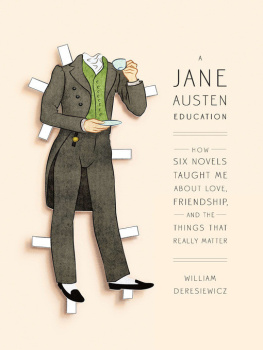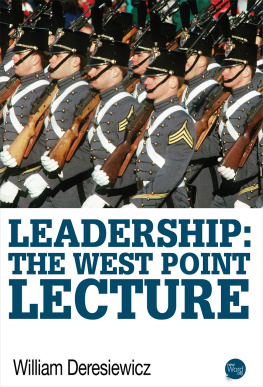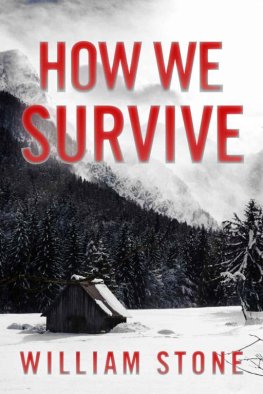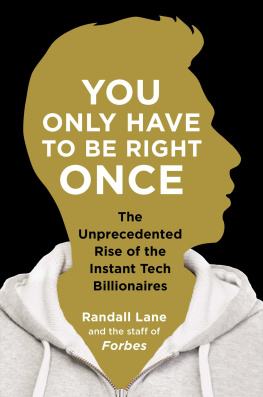William Deresiewicz - The Death of the Artist: How Creators Are Struggling to Survive in the Age of Billionaires and Big Tech
Here you can read online William Deresiewicz - The Death of the Artist: How Creators Are Struggling to Survive in the Age of Billionaires and Big Tech full text of the book (entire story) in english for free. Download pdf and epub, get meaning, cover and reviews about this ebook. year: 2020, publisher: Henry Holt and Co., genre: Art. Description of the work, (preface) as well as reviews are available. Best literature library LitArk.com created for fans of good reading and offers a wide selection of genres:
Romance novel
Science fiction
Adventure
Detective
Science
History
Home and family
Prose
Art
Politics
Computer
Non-fiction
Religion
Business
Children
Humor
Choose a favorite category and find really read worthwhile books. Enjoy immersion in the world of imagination, feel the emotions of the characters or learn something new for yourself, make an fascinating discovery.

- Book:The Death of the Artist: How Creators Are Struggling to Survive in the Age of Billionaires and Big Tech
- Author:
- Publisher:Henry Holt and Co.
- Genre:
- Year:2020
- Rating:5 / 5
- Favourites:Add to favourites
- Your mark:
- 100
- 1
- 2
- 3
- 4
- 5
The Death of the Artist: How Creators Are Struggling to Survive in the Age of Billionaires and Big Tech: summary, description and annotation
We offer to read an annotation, description, summary or preface (depends on what the author of the book "The Death of the Artist: How Creators Are Struggling to Survive in the Age of Billionaires and Big Tech" wrote himself). If you haven't found the necessary information about the book — write in the comments, we will try to find it.
William Deresiewicz: author's other books
Who wrote The Death of the Artist: How Creators Are Struggling to Survive in the Age of Billionaires and Big Tech? Find out the surname, the name of the author of the book and a list of all author's works by series.
The Death of the Artist: How Creators Are Struggling to Survive in the Age of Billionaires and Big Tech — read online for free the complete book (whole text) full work
Below is the text of the book, divided by pages. System saving the place of the last page read, allows you to conveniently read the book "The Death of the Artist: How Creators Are Struggling to Survive in the Age of Billionaires and Big Tech" online for free, without having to search again every time where you left off. Put a bookmark, and you can go to the page where you finished reading at any time.
Font size:
Interval:
Bookmark:
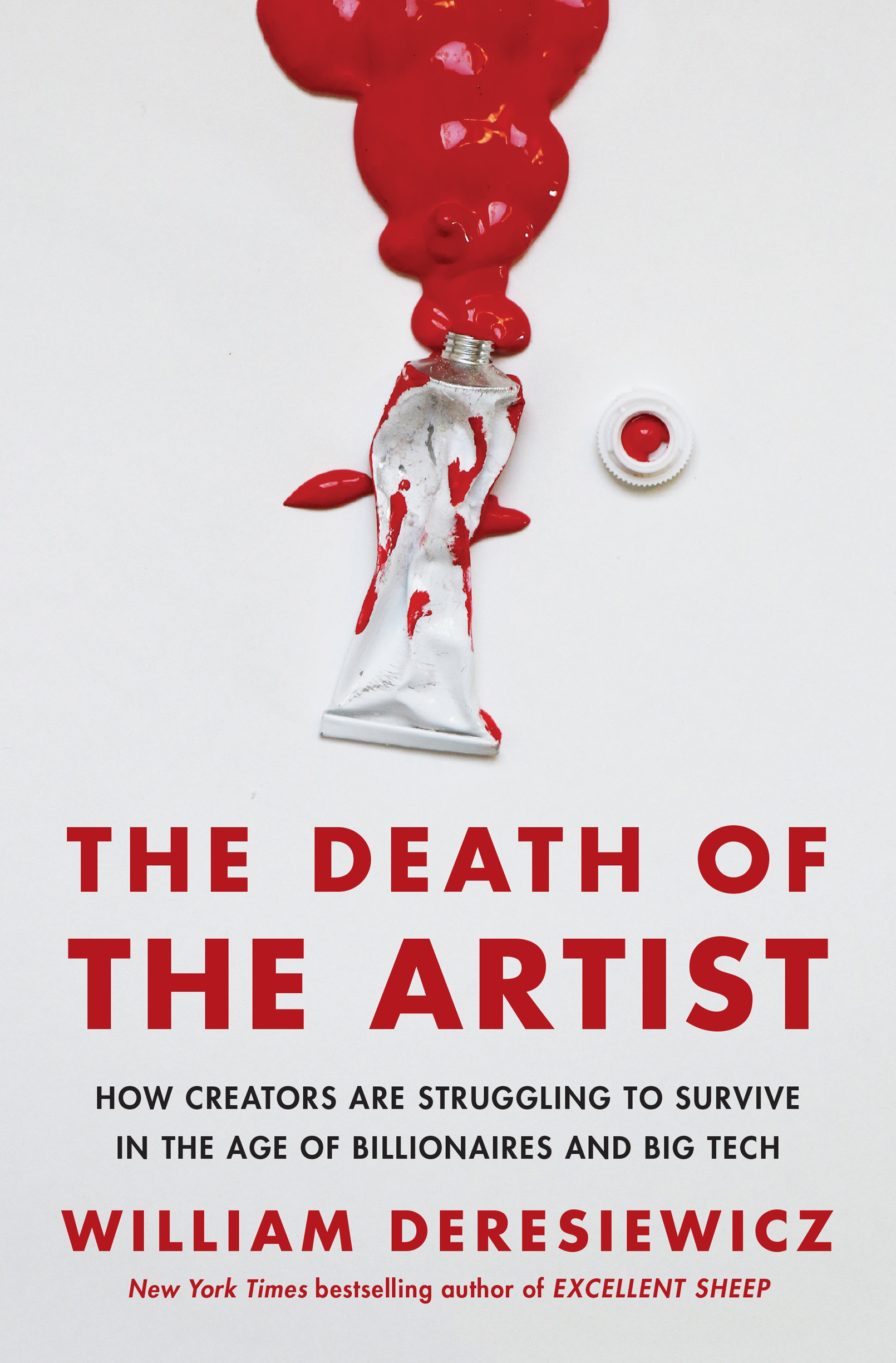

The author and publisher have provided this e-book to you for your personal use only. You may not make this e-book publicly available in any way. Copyright infringement is against the law. If you believe the copy of this e-book you are reading infringes on the authors copyright, please notify the publisher at: us.macmillanusa.com/piracy.
To Jill
This is a book about art and money and the relationship between the two and how that relationship is changing and in turn changing art. It is a book about how artistsmusicians, writers, visual artists, creators of film and televisionare making a living, or struggling to, in the twenty-first-century economy.
A few vignettes:
Matthue Roth is a Hasidic Jewish memoirist, young adult novelist, childrens book author, short story writer, slam poet, video game designer, blogger, zinester, columnist, and screenwriter who once dated a non-Jewish sex worker, performed on Broadway with Def Poetry Jam, and became the only male member of Sister Spit, a feminist spoken-word collective in San Francisco, where hed make Shabbos dinner for the riot grrrls. His books carry titles like Yom Kippur a Go-Go, Never Mind the Goldbergs, and My First Kafka (one of the childrens books). A sweet, almost childlike man, Roth composes in little notebooks during his hour-long commute between Manhattan and Brooklyn, where he lives with his wife and four children. If he gets an idea on the Sabbath (and he gets ideas all the time), he has to wait until dark to write it down.
Most of what Roth does earns little or no money. When he sold his first novel for $10,000 in 2004, the sum was roughly twice as much as he had made the year before. In 2016, after working for a Jewish website producing video content, an EdTech company creating video games, and Sesame Workshop writing science-related sketches, Roth responded to a blind posting on the Facebook page of a small New Yorkarea game-writers group. It turned out to be for a job at Google. As a creative writer. His first position there was as a member of the personality team for Google Assistant, writing lines of dialogue and devising Easter eggssurprise bonuses and jokes.
Once I got the Google job, a lot of my friends were like, Oh, youve hit easy street, Roth told me, and I thought I had for about a week and a half. But the job turned out to be contract work, with no benefits: good money for his young, single coworkers, less so for someone whose family spends about $30,000 a year on health insurance. His position was renewable for three to six months at a time, limited by state law to a total of two years. When we spoke, he was up to a year and a half. He was also facing down another benchmark. Almost thirty-nine and a half, he replied when I asked for his age. Im getting less young every day. Roth went on to compare himself to the Ocean of Notions, the storyteller in Salman Rushdies childrens novel Haroun and the Sea of Stories, whose idea spigot runs dry one day. Im scared shitless that my brains going to turn off or that Im going to get too afraid to constantly come up with new and exciting ideas, he saidand thus that, on the brink of midlife, he will become unemployable as a creative person.
Lily Kolodny (not her real name) is, by any reasonable standard, a successful young illustrator. Her charmingly childlike style has won her commissions from Penguin Random House, HarperCollins, the New York Times, the New Yorker, and many other well-known publishers and publications. My friends would always say to me, Youre so lucky, youve found the thing that youre supposed to be doing, she told me. And when I do feel talented, and I feel like Im in the flow, Im like, I know how to do this. I should be doing this.
At the same time, Kolodny is consumed by financial anxiety. Ive always just survived, she said. I dont have any savings, really. When I asked her what her nut wasthe number, in dollars, that she felt that she needed to get to each yearshe said, I dont have a number, but thats because Ive been postponing the idea of having a number. Its been hard for me to visualize the future. Things had actually been looking up for her a bit around the time we spoke. In recent months, she had engaged in conscience-free eating out on several occasions, and had bought a few things, and was no longer constantly checking her bank account to see if the rent would clear. She was also working with an agent on a project that she hoped would bring her career to the next level, an impressionistic semi-fictional illustrated memoir, as she described it. Ive thought of it as my get-rich-quick scheme, she said. But its not very quick, she laughed, its very slow.
For me, thats the golden egg, Kolodny explained. If that crashes and burns, then I have to assess everything. And what would that assessment look like? What else could she do instead? Plan B would be teaching, ideally art but anything, if necessary. Plan C would be any job at all. Everyone I know, she said, if theyre not in a nine-to-five job, or theyre not a trustafarian, theyre a yoga teacher, or an Uber driver, or a nanny. It would be hard for her, after all these years, to turn to something like that, thats so disconnected from my trade. But Kolodny, who was thirty-four at the time we spoke, also knew that she was reaching a decision point. Its not sustainable, she said about her situation, especially if I want to have a kid. Well, actually, if I want to have a kidI do want to have a kid.
Martin Bradstreet was twenty-nine when he got to live out his musical dreams. Bradstreet, who grew up in Australia and lives in Montral, was the founder of the rock band Alexei Martov. (Their music can best be described as loud.) The band built a following around Montral with shows that they promoted on Facebook. Then, in 2015, Bradstreet decided to put together a tour. For a musician like him, he told me, thats what success is: touring around in a van, playing songs you worked on with your friends, expressing something meaningful to total strangers.
So Bradstreet got online, searched for bands that were similar to his, and looked at tour schedules, hundreds of them, to identify the venues where those bands had played. Then he went on Indie on the Move, a database of venues, for contact information. Places are more likely to book you, he said, if you approach them with a full program already lined upmeaning you plus a couple of local actsso hed look up, say, eighty bands in Louisville and listen to their music to find the most compatible ones to reach out to. Then, he said, youve got to work out how to promote a show in a city youve never been to, at a venue youve never played at, with bands you dont know, which he did, in part, by getting the venues to give him their media contacts so he could approach the latter directly.
Yes, Bradstreet agreed, its a lot of work, but thanks to the Internet, all you need to tour is work. Youre going to lose money at first, he explained, but money wasnt the point for him. (Bradstreet was supporting himself on his savings from online poker and, as he put it, other investments.) He would have liked to get to the next levela publicist, a booking agent, a record dealbut, he said, there are a lot of really talented mes out there. By the time we spoke, Bradstreet had moved on to other pursuits. It does seem like playing music for a living would be a nice thing to have done, he said, growing wistful, but its tough to fit everything together especially in modern life as you get older. Still, he had no regrets. Of the tours roughly fifty shows, he said, half are amongst the best hundred nights of my life.
Font size:
Interval:
Bookmark:
Similar books «The Death of the Artist: How Creators Are Struggling to Survive in the Age of Billionaires and Big Tech»
Look at similar books to The Death of the Artist: How Creators Are Struggling to Survive in the Age of Billionaires and Big Tech. We have selected literature similar in name and meaning in the hope of providing readers with more options to find new, interesting, not yet read works.
Discussion, reviews of the book The Death of the Artist: How Creators Are Struggling to Survive in the Age of Billionaires and Big Tech and just readers' own opinions. Leave your comments, write what you think about the work, its meaning or the main characters. Specify what exactly you liked and what you didn't like, and why you think so.

